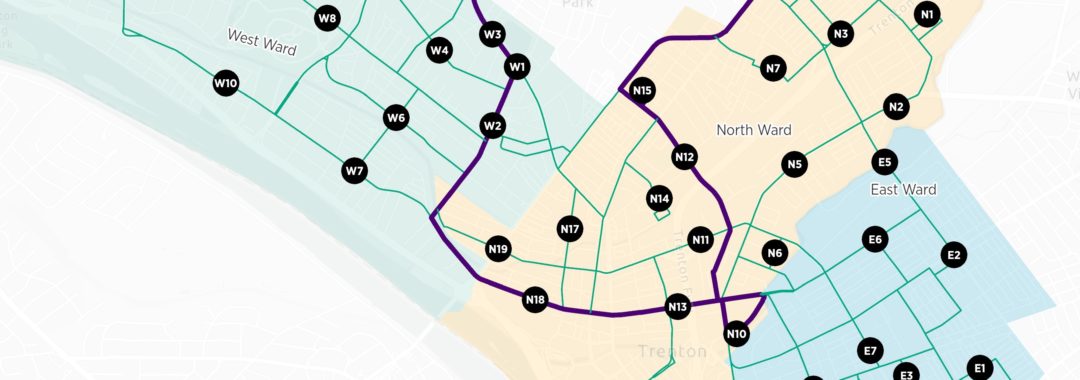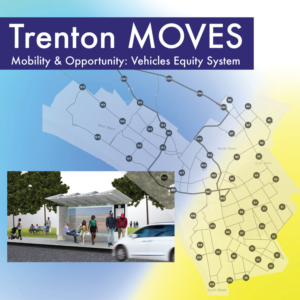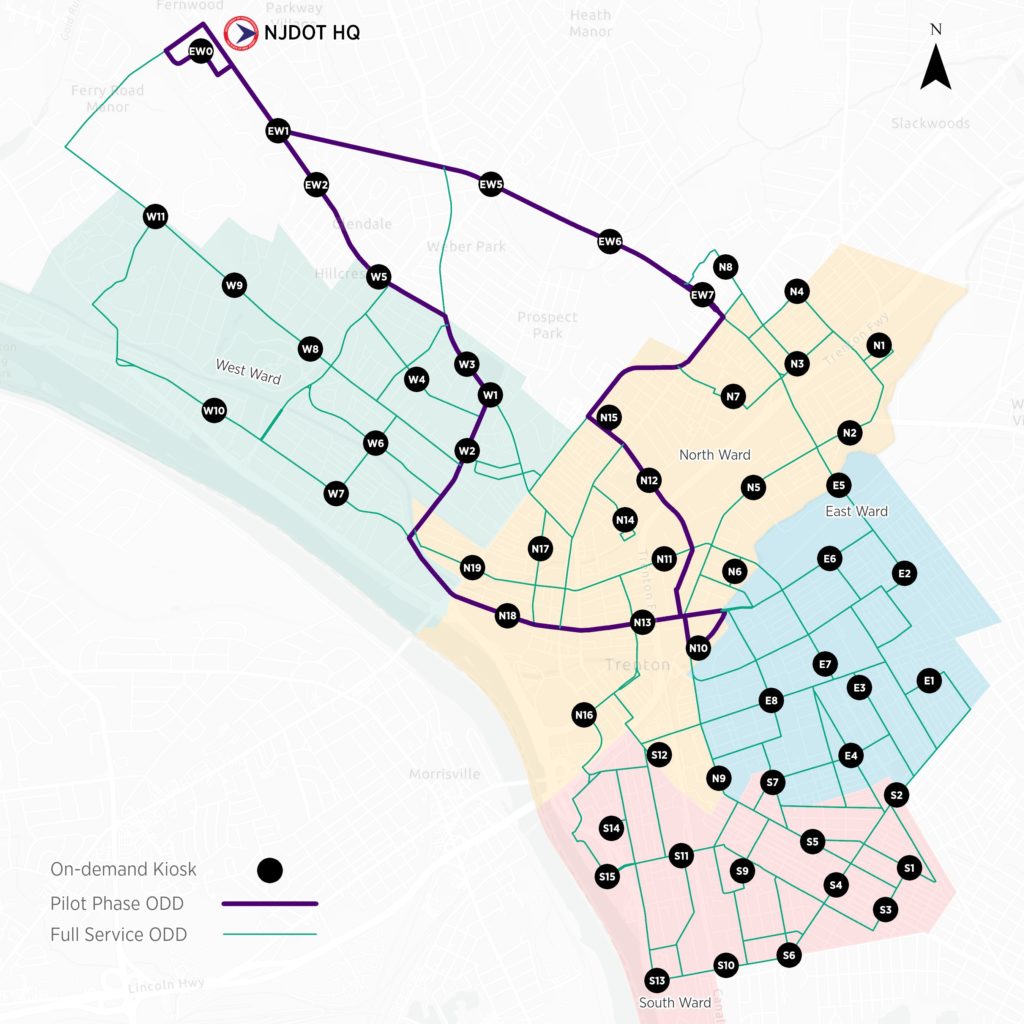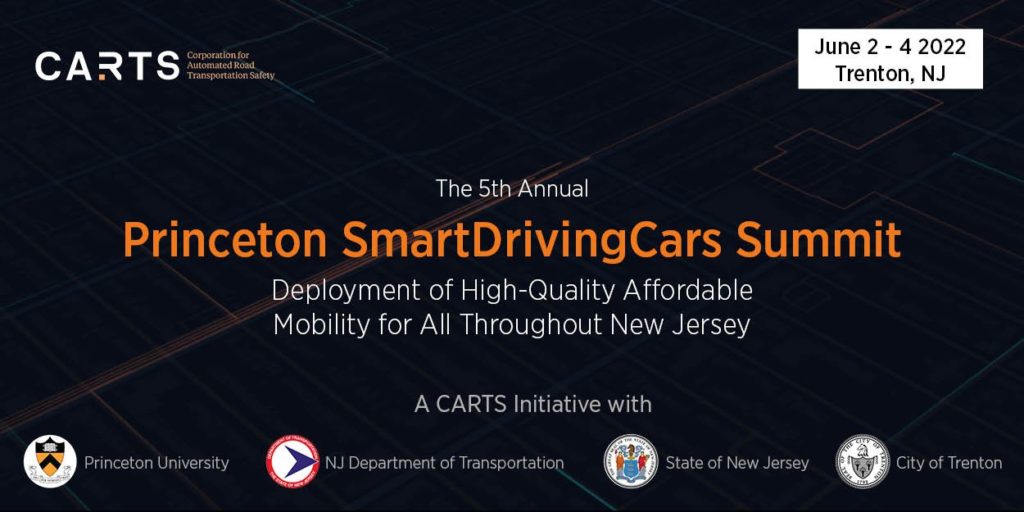On February 11, 2022, New Jersey Department of Transportation (NJDOT) awarded a $5,000,000 Local Transportation Project Fund Grant to the City of Trenton to support the Trenton Mobility and Opportunity: Vehicles Equity System (MOVES) project. The core vision, goals and features of the project - an autonomous vehicle transportation system capable of serving 90,000 Trenton residents and commuting workers -- were outlined in a Request for Expressions of Interest (RFEI) issued in December 2021.
The system is expected to comprise 100 autonomous, electric shuttle vehicles and 50 kiosks and will operate solely as an on-demand system, with no fixed routes or schedules. The vehicles will be handicapped accessible and accommodate up to eight passengers.
Kiosks will be located at popular locations and high-density residential/commercial areas within a five-minute walk by over 90 percent of Trenton residents. Riders will be able to hail the vehicles through mobile devices or through an interface at each kiosk for those lacking access to a mobile device.
Through its partnership with Princeton University and the Corporation for Automated Road Transportation Safety (CARTS), NJDOT supported an extensive public outreach process to support the development of the RFEI. This outreach revealed several notable current conditions: 70 percent of Trenton households have one or no personal vehicle; due to land use decisions of prior decades and the lack of frequent bus service, seniors have to take circuitous bus rides, schedule an access-a-ride in advance, or walk significant distances to access destinations for everyday needs; and high school students living within two miles of the high school were without access to a bus because of a national bus driver shortage. The new system is intended to alleviate these and other limitations of the current transportation structure. The public engagement informed the RFEI and generated five goals for the program.
Goals of the Program
Safety
Autonomous vehicles can provide improved safety as they are not subject to human fallibilities, such as driving distracted or speeding. Some acclimation will be needed to ride in a vehicle with no driver. For the first two years of the project, vetted safety hosts will be on the vehicles to assist riders in understanding and navigating the system. The project will initially be limited to its operational design domain while on public roads.
Equity
A significant majority of Trentonians live in Areas of Persistent Poverty, own one or no cars, and spend a high proportion of their income on transportation within the City. The program must serve the transportation needs of all Trenton residents, particularly those with limited transportation access due to economic or physical hardships. The service will aim to be inclusive both in terms of communities served and user experiences.
Affordability
The program will aim to be both low cost to the rider and the taxpayer. As NJDOT wants it to be both equitably and fiscally viable long into the future, its costs should be attainable and fares should be affordable. The rider should pay fares comparable to transit service, and far less than would be paid for ride-hailing and taxi services. Trenton MOVES will also create a public-private partnership to assist with the development of the on-demand mobility system and anticipate reduced costs through scaling and innovative funding mechanisms.
Sustainability
As New Jersey will be phasing out the sale of gasoline powered vehicles by 2035 to help reduce emissions, all of the initial 100 AVs in the Trenton MOVES project will be 100 percent electric. Additionally, the on-demand function stands to reduce average vehicle occupancy, vehicle miles traveled, and greenhouse gas emissions for local trips within Trenton.
Efficiency
To maximize the convenience of the on-demand mobility service, Trenton MOVES seeks to minimize wait times, ride times, have low circuity during shared rides, and reduce VMTs, particularly when the vehicles are empty. This goal will be achieved through active fleet management, dynamic repositioning, optimal routing, data analytics, etc.
How it will work
NJDOT anticipates a four-phase process to enable the autonomous vehicles within Trenton, and eventually to expand statewide and potentially beyond. Availability of service in Trenton is anticipated for early 2024.
Phase One will consist of the verification of the autonomous vehicle concept. The company selected to create this on-demand mobility service will first operate the autonomous vehicles on and around NJDOT’s Ewing campus to verify functionality in low stress environments.
Phase Two will be a proof of concept. Once the automated vehicles are shown to be effective, 100 vehicles will be placed on the public roads within a limited Operational Design Domain (ODD). This ODD will consist of major public centers in Trenton such as the Capitol Complex, schools, public housing, grocery stores, the Trenton Transportation Center, etc. A kiosk will be placed at each of these points to allow people to “call” to the vehicles.
Phase Three will be proof of societal value. In the third phase, the ODD will expand to all of Trenton to the point where 95 percent of the population is within a 5-minute walk of any kiosk. This expansion will demonstrate effectiveness of service, and scalability in an urban setting.
Phase Four is proof of network-scale economics. Once proven effective in Trenton, the program and the service could be launched throughout Mercer County, and in densely populated places in New Jersey such as Atlantic City, Camden, Newark, and New Brunswick. If those cities continue to prove effective in terms of service scalability, the autonomous vehicles can then be launched in more cities nationwide.
Upcoming Event - Princeton SmartDrivingCars Summit
From June 2nd to June 4th, CARTS and Princeton University have organized a gathering of leaders from within the industry, academia, public sector, and local communities to discuss the progress being made on the autonomous vehicle transportation. This year there will be an extensive discussion on Trenton MOVES as the program moves forward. To learn more, click here.
Resources
Burns, K. P. (2022, February 13). Trenton receives $5 million grant to make MOVES for residents. WHYY. https://whyy.org/articles/trenton-receives-5-million-grant-to-make-moves-for-residents/
New Jersey Announces Grant for Trenton MOVES Autonomous Vehicle-Based Urban Transit System Project. (2022, February 11). Mass Transit Magazine. https://www.masstransitmag.com/alt-mobility/autonomous-vehicles/press-release/21256516/new-jersey-office-of-the-governor-new-jersey-announces-grant-for-trenton-moves-autonomous-vehiclebased-urban-transit-system-project
New Jersey Department of Transportation [NJDOT Technology Transfer]. (2022, March 16). NJ STIC 1st Quarterly Meeting 2022, March 16, 2022 [Video]. YouTube. Presentation starts at 1 hour, 21 mins. https://youtu.be/rHIr8UW4zLg?t=4862
Partners for Automated Vehicle Education. (2022, May 4). PAVE’s Virtual Panel “AVs and Public Good: Trenton MOVES” [Video]. YouTube. https://www.youtube.com/watch?v=KawGghbte4s
Propel: NJDOT Commissioner Gutierrez-Scaccetti and the Trenton NJ MOVES Program - Allen & Overy. April 29, 2022). [Podcast]. https://www.allenovery.com/en-gb/germany/news-and-insights/publications/propel-njdot-commissioner-gutierrez-scaccetti-and-the-trenton-nj-moves-program
Smart Driving Cars Podcast. (2022, January 17). Smart Driving Cars 251 special edition: Making it Happen: Trenton Moves [Video]. YouTube. https://www.youtube.com/watch?v=DT8rmDYzwkg
State of New Jersey. (2021, December 6). Office of the Governor | Murphy Administration Announces RFEI for Project to Create the First Autonomous Vehicle-Based Urban Transit System in America [Press release and RFEI]. https://nj.gov/governor/news/news/562021/approved/20211206b.shtml




